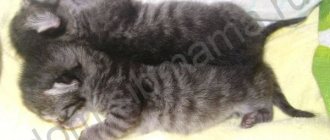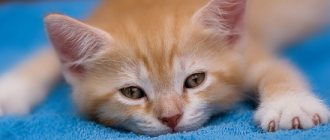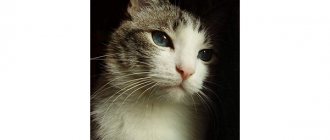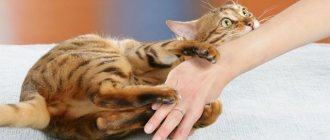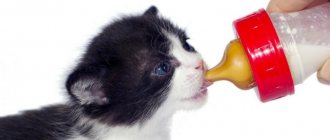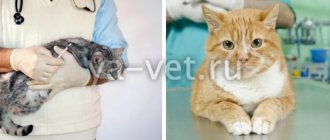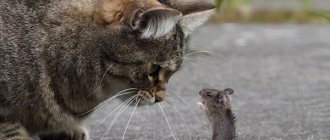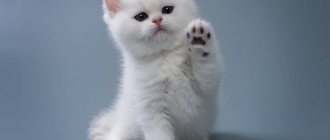What to do if a kitten clings to various objects, like a mother cat? How to wean him from this habit? The formation of the sucking reflex in kittens occurs in the first 6-8 days of their life. Like all mammals, cats receive all the necessary nutrients from their mother's milk during infancy. As they grow older, they switch to adult food. But it often happens that almost adult cats suck on a cat’s breast. And if the cat is not nearby, then they stick to objects (blanket, clothes, plaid, furniture, etc.).
Why do kittens stick to objects?
Neighbor cat fluffy blanket
In the first days of life, kittens find nipples by the smell and body temperature of the cat. After about 10-15 days (depending on the breed), their eyes open. The sucking reflex will be established during this period of life. Therefore, when sucking, they will be guided mainly by smell, tactile sensations, warmth, and not by sight or hearing.
The cat, as a rule, independently decides on the issue of stopping the “babies”’ access to milk. Therefore, it often happens that the milk has already run out, but the kittens still continue to suckle. A good cat is unaware of the possible consequences. Kittens teething can damage the skin of her nipples. Which is fraught with the entry of bacteria and infections into the wound. Some cats do not prevent sucking. This leads to the fact that babies’ sucking reflex is delayed for a long time.
It often happens that a relatively adult kitten is taken by new owners. He begins to see “mother” in other objects. It purrs, moves its paws and clings, for example, to a blanket, to a rug, to clothes, to a person’s body. The main reasons for this behavior:
- Early weaning of a kitten from its mother cat
- Lack of care and warmth from the owner
- Breed predisposition and genetics
- Congenital pathologies, developmental problems
- Ordinary boredom
- Hunger (if the pet is bottle-fed)
- Stress
- Poor diet
Kittens under two months of age
There is no need to rush to take home a baby at the age of 1-2 months. This is not the best time to part with your cat. In the period up to 2 months, kittens acquire important skills. A well-mannered mother teaches her kids:
- use a scratching post rather than upholstered furniture;
- go to the litter box;
- use claws and teeth for their intended purpose;
- eat complementary foods;
- Follow cat hygiene rules.
It may seem that the owners can teach all this. But experts rightfully claim that cats are much better at this upbringing. The kitten learns all these rules without stress and learns them better.
There are also anatomical features that prevent kittens from being weaned at the age of 2 months. At this time, babies are vaccinated to build immunity. But the protective system does not strengthen immediately. This requires 2-3 weeks. The process is faster and better if the kitten is with its mother and receives an additional supply of antibodies with her milk.
How to properly wean a kitten from cat sucking?
Kittens feed on mother cat's milk
When kittens are 9-12 weeks old, mother cat's lactation period usually comes to an end. During this period, it is important to accustom them to adult food. Most cats try not to nurse on their own. To do this, they lie on their stomachs, move their babies away from them, or try to lie down where the babies cannot reach her.
If this does not happen, then you can put a special blanket on the cat. Which will prevent babies from accessing her breasts.
Instead, as they grow older, babies are periodically separated from the cat. For example, they take you out of the room for a while and close the door. At this time, they are given bowls with cat milk replacer. Gently poke the pets with their nose. So that when they lick the milk from their faces, they feel its taste. And they showed interest in the contents of the bowls when they got hungry. Cat milk replacer should be at room temperature or warmer. Gradually increase the time the “children” are alone. Don't leave them alone, it's stressful for them. Talk affectionately, take them off, sometimes stroke them, give them toys, pick them up. So that they get used to the person and do not feel loneliness.
Kittens are introduced to solid food gradually. There are special mixtures and liquid foods for newborns and small kittens. Up to two months you need to feed four times a day. Regardless of their consumption of mother's milk. After 6 months, the child is gradually transferred to solid food and the frequency of meals is reduced. In addition to special food, you can give boiled chicken and minced veal (depending on the breed). After about a year, cats are completely transferred to an adult diet.
It is possible to completely separate babies from their mother (in order to transfer them to another family) only after 2 months. Earlier weaning encourages the kitten to suck on objects and human clothing. He will look for his mother.
The optimal age for a kitten to be weaned from its mother, why you can’t take the baby earlier
Not all cat lovers pay attention to the age at which a kitten is separated from its mother. However, this factor deserves attention. Many people believe that it is better to pick up the baby early in order to promptly accustom him to cat litter, the food that he will constantly eat. But these are misconceptions. There is an optimal age for weaning a kitten from a cat, which ensures smooth adaptation and reduces the risk of various problems. It is worth studying the features of the development and upbringing of children in different periods in order to make the right decision.
How to wean a kitten from sucking objects?
Kittens love attention, care and affection.
If a cat jumps into your bed in the morning, purrs and interrupts with its paws, then this is a sign of trust and love for the owner. If at the same time she clings to a blanket saturated with the smell of a person, it means she considers him her patron and protector. But if sucking occurs in the absence of a person (and at other times of the day), then this indicates some problems. They need to be identified and eliminated.
First, try to review your diet. Perhaps your pet is lacking some nutrients. He tries to replenish the necessary elements through sucking objects. Replace the food, let the kitten try other flavors or food from other manufacturers. Use high-quality premium food labeled “For kittens.” Or with a note about age. The food in this segment includes all the microelements, nutrients, vitamins, and additives necessary for the baby’s growth and development.
Eliminate anything it sticks to. Do not leave clothes or blankets within the kitten's reach. Try to distract the cat by playing games or holding it in your hands or petting it. Provide your kitten with toys that he can play with in your absence. So that he doesn't get bored while you're at work.
If the cat shows interest in clothing, then it can be treated with essential oils with the scent of citrus, pine or menthol . But it’s better to put all your things in a closet or drawers. Do not scatter them around the room, on the sofa or bed.
It is recommended to contact your veterinarian if none of these methods help. Perhaps the problem of sucking and chewing various objects is associated with changing teeth or problems in the endocrine system.
Zoologists claim that in some cases, sucking is a consequence of the animal’s psychological trauma received at an early age. In this case, weaning will be useless. As a rule, any sucking goes away on its own within 3 years of the pet’s life.
Possible health problems
Significant problems can also arise with the health of a pet that is separated from the cat for up to three months. During this period, the most important processes in the formation of organs and systems take place. The presence of breast milk eliminates the deficiency of essential minerals, vitamins, and other microelements. This allows the digestive system to establish the production of enzymes necessary for food processing, gradually, in a normal manner. A kitten that begins to eat regular food before the age of three months may experience various disruptions in the gastrointestinal tract. This often becomes the cause of chronic diseases.
It is known that cats have good health; their bodies cope with many diseases on their own, without medical help. These qualities are ensured by the strong immunity that nature provides to animals. The body of a newborn kitten is practically deprived of this natural defense and cannot produce antibodies to fight pathogenic microbes and bacteria. They come to babies from mother's milk. If kittens are deprived of this source too early, immunity does not have time to form and strengthen. Consequently, a favorable environment is created for the development of infections and inflammations.
Veterinary pharmacology includes vaccinations to strengthen the natural defense system. But they can only be done at 2 months. After this, the kitten remains defenseless against these aggressors for some time; it still requires help in the form of mother's milk. Therefore, babies who were taken before three months often get sick.
What not to do?
You cannot shout at your pet or punish it.
You cannot swear, shout at the kitten, much less hit it . For him, this is additional stress, which will in no way help eliminate the problem. Do not create stressful situations for the animal. For harmonious development, like human babies, kittens must grow up in comfort, love, affection and care. They should have their own place (bed, house), toys, their own dishes, proper diet, water, toilet. They should receive attention and care from their owner. But in moderation. Animals do not like to be held a lot against their will. If the cat has sat on your lap and wants to go for a walk, don’t interfere.
Do not lubricate the cat's chest with any bitter or sour substances . Kittens can get poisoned or get an upset stomach. Such procedures are also not safe for the cat’s health. The skin of the nipples is delicate and can harm the cat's health.
Do not try to wean babies from sucking by spraying water. This will cause them to have a phobia of water in adulthood (there will be problems with bathing). Or they will form the wrong attitude towards the owner. Which they will fear rather than love.
Optimal age: three months
Most experts agree that the best time to wean a cat is three months. There are good reasons for this assertion. By this time, the kitten has developed a strong immune system and has certain skills. Three month old babies:
- have social skills and easily get used to strangers;
- know how to eat solid food and drink independently;
- Carefully lick the fur and wash.
At this age, it is not difficult to instill in a kitten the rules of cat etiquette. Mom has already taught him to go to the litter box, all that remains is to show him where he is. The baby will quickly master the scratching post if the cat has used such a device. An important advantage is the high-quality functioning of the digestive system, which already digests solid food.
By this age, the kitten’s immunity is fully formed. In addition, he has already received the first vaccinations against rhinotracheitis, chlamydia, calcivirosis, rabies, panleukopenia, and has been treated for helminths. Consequently, the new owner will not have problems, and the risk of the baby getting sick is minimal.
What happens if a kitten is not weaned from sucking objects?
At first glance, sucking objects is a harmless procedure. Unlike the more typical cat behavior of eating house flowers or damaging furniture with their claws. However, this phenomenon has hidden threats. Indeed, in addition to wet areas (where the kitten has attached itself), there are other consequences.
When sucking on a blanket, rug, bedspread or other product, lumps of fabric will enter the stomach. This can cause digestive tract upset, vomiting, and abnormal bowel movements. In addition, fabric dyes are often very toxic and dangerous for the animal. Getting them inside is fraught with consequences.
By sucking on the same place, a cat can damage an object . When they suck an object, they simultaneously crush it with their paws. In this case, the kitten usually releases its claws. Unsharpened claws damage the fabric. And a place that has been sucked on many times in a row may remain stained by the animal’s mouth and tongue; the tissue will become damaged by repeated exposure to saliva.
Instincts and memory
Cats are intelligent mammals and have excellent memories. True, they have it a little worse than dogs. Animals remember and distinguish people by subtle, elusive odors, but can they really not remember a blood relative - brother, mother, sister?
Scientists answer this question - yes, they can. But this does not play a significant role. When a cat's offspring grow up - about six months after giving birth, her maternal instinct fades away. She perceives a grown-up daughter or son as a competitor for food, the attention of the owners and “a place in the sun.” Her next heat begins, it’s time to raise another offspring, so the cat drives away the matured offspring so that they do not disturb her.
Coexistence between animals in different conditions
Often, for example, among breeders, several generations of cats of different levels of kinship live peacefully with each other and do not share resources. In the wild, cats try to stay together in a pack, in which the smartest and most mature females rule. They perceive their matured sons as low-ranking males, and try not to mate with them - related genes can lead to harmful mutations. “Young people” live for the most part with their parents. The flock drives away strangers as competitors for resources at all times, except during the estrus period of the older female. An alien adult and strong cat can mate with a female and destroy weaker rivals, including kittens.
